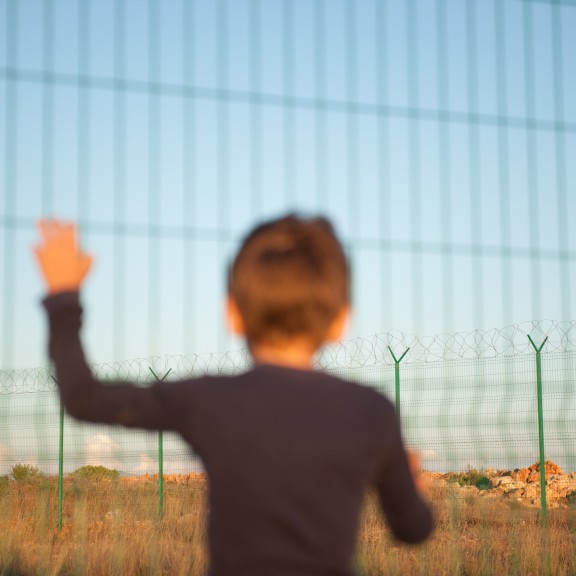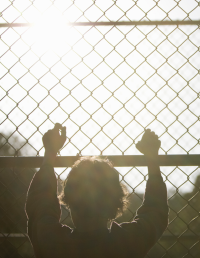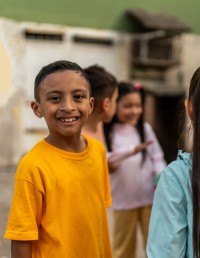Trump administration moves to end settlement that protects immigrant children; Flores counsel vow to defend vital safeguards
The Flores Settlement is more critical than ever to protect immigrant children from indefinite detention in dangerous conditions
Today, the Trump administration filed a motion to terminate the Flores Settlement Agreement, which for years has set the standards for the humane treatment of immigrant children in government custody, many of whom arrive seeking refuge and protection. The motion recycles many of the arguments that have been brought forward by the federal government — and rejected by courts — multiple times.
If the government's motion is successful, children in federal immigration custody will no longer be entitled to any of the Settlement's basic protections, such as the requirement they be provided adequate food, water, and clean clothes, regardless of whether they're detained with their parents in family detention or alone.
As immigrant children and families are under attack, the Flores Settlement is more important now than ever before. Right now, children are being detained with their families in egregious conditions, some children are being held in government custody for months, even when their families are ready to take them home. The Settlement remains the primary — and sometimes the only — tool for protecting these children’s freedom, health, and safety.
The Flores co-counsel team of the Center for Human Rights and Constitutional Law (CHRCL), National Center for Youth Law (NCYL), and Children’s Rights (CR) remains steadfast in defending this critical set of protections.
The government’s move to end the Settlement comes at a time when significantly fewer immigrant children and families are arriving than in recent years — yet those who do are being detained for increasingly longer periods of time. All children — whether accompanied by their parents and detained in Customs and Border Protection (CBP) or Immigration and Customs Enforcement (ICE) family detention facilities, or unaccompanied and held in Office of Refugee Resettlement (ORR) custody—are facing dangerously prolonged detention that puts their health and well-being at serious risk. Decades of monitoring and interviews with children and their families have shown that the longer a child is detained, the higher the risk of harm and deterioration of physical and mental health.
“Children who seek refuge in our country should be met with open arms — not imprisonment, deprivation, and abuse,” said Sergio Perez, Executive Director of the Center for Human Rights and Constitutional Law. “The Trump Administration’s move to dismiss this agreement, which prevents the government from imprisoning children in brutal conditions indefinitely, is another lawless step towards sacrificing accountability and human decency in favor of a political agenda that demonizes refugees.”
"Countless children have experienced unimaginable harms while in government custody," said Mishan Wroe, Senior Attorney at the National Center for Youth Law. "Eviscerating the rudimentary protections that these children have is unconscionable. At this very moment, babies and toddlers are being detained in family detention, and children all over the country are being detained and separated from their families unnecessarily. Now, more than ever, the government needs the accountability that comes with federal court oversight."
“With their latest legal maneuver, the Trump administration seeks to strip children of basic human rights and subject them to indefinite detention in prison-like border patrol and family detention facilities that no child should endure,” said Leecia Welch, Deputy Litigation Director at Children’s Rights. “Across the country, children are the latest victims of inhumane deportation practices that are ripping them out of their schools and communities. We will not just stand by while children are locked up and used as political pawns, and we will do everything in our power to defend children’s freedom, dignity and rights.”
Since the Flores Settlement was reached in 1997, ongoing government violations of the Settlement have required co-counsel to repeatedly file motions to enforce the terms of the agreement. Time and again, the court has found the government in breach of the Settlement’s terms and rejected the government’s attempts to terminate the Settlement.
Below is a partial snapshot of the case over the years, demonstrating the Settlement’s basic protections, the government’s repeated noncompliance, resulting harm to children, and the continued need to safeguard children’s health and safety:
- 1985: The Flores case was filed to address the mistreatment of immigrant children in federal custody, and the government’s refusal to release them to non-parent family members. At the time, there were no requirements as to the types of facilities that could be used as immigration detention centers or standards for detaining children — 15-year-old Jenny Flores was detained in a hotel surrounded by a chain-link fence and children were routinely subjected to strip searches.
- J.S.: “I have spent almost two months here at the Florence detention center. It is miserable living here. When I first got here, a guard made me take off all my clothes and he inspected my body to see if I was hiding anything. They do that every time I come back from immigration court. It bothers me. I spend most of my day locked in a room.”
- 2015: ICE began detaining all female-headed families, including children, in secure, unlicensed detention facilities for prolonged periods of time. After Flores counsel filed a motion to enforce, the government filed a motion to modify the Settlement to exclude accompanied children from its protections. The court found the government had breached the Settlement’s requirement to hold children in licensed facilities and found that the Settlement applied to all children in federal immigration custody.
- E.D.: “My daughter feels very sad. She doesn’t want to be here . . . I beg her to eat, but she doesn’t.”
- 2018: During Flores counsel site visits to ORR facilities, unaccompanied children described being administered psychotropic medication without informed consent, experiencing or witnessing forced medication injections, and being transferred to more restrictive facilities without due process. After Flores counsel filed a motion to enforce, the court found the government had breached multiple Settlement provisions, including the administration of psychotropic drugs to children without appropriate consent and denying children licensed placement without adequate cause, among others.
- J.Z.: “The staff threatened to throw me on the ground and force me to take the medication. I also saw staff throw another youth to the ground, pry his mouth open and force him to take the medicine . . . They told me that if I did not take the medicine I could not leave . . ..”
- 2019: During Flores counsel site visits to CBP facilities, dozens of children described abhorrent and dangerous conditions. More than 60 declarations from detained children, their parents, physicians, and attorneys detailed children detained without access to basic sanitation — including soap, clean water, showers, clean clothing, or toothbrushes — and enduring cold temperatures, lights on 24 hours a day, and a lack of adequate food. These declarations were corroborated by the Department of Homeland Security’s own inspectors. After Flores counsel filed a temporary restraining order, the government agreed to mediation and to further settlement terms regarding CBP facilities.
- W.A.C.L.: “The conditions are very crowded in the cage where I am at. There are about 75 people each night that I have been here. We sleep literally stacked on top of each other shoulder to shoulder. So many are sick.”
- 2020: The government transferred more than 650 children from CBP to ICE custody, detained the children in motels under the supervision of private contractors lacking childcare qualifications, blocked access to attorneys, and ultimately expelled them from the U.S. under Title 42. Many of these children - including babies and toddlers - were detained in motels for more than a week. After Flores counsel filed a motion to enforce, the court found that the government had breached the Settlement’s requirement to hold children in licensed placements and in conditions that are safe and account for the vulnerability of children.
- Jennifer Nagda, Young Center for Immigrant Children’s Rights: “In one case, a girl younger than nine years old who was awaiting repatriation spent seven nights in a hotel room with adults who were strangers to her.”
- 2021: ORR contracted with private companies to open 14 “Emergency Intake Sites,” which held children in varying physical facilities, including massive tents on military bases, convention halls, and oil worker “man camps.” Through hundreds of interviews with unaccompanied children, Flores counsel learned that children detained in these sites were denied access to education, recreation, adequate food, and healthcare, among other basic needs. The sites had little to no oversight from trained staff and some children unnecessarily languished for weeks or months with little communication with their families or caseworkers. After Flores counsel filed a motion to enforce, the government agreed to mediation and to further settlement terms regarding Emergency Intake Sites.
- J.F.A.A.: “I felt anguished and hopeless . . . You spend the day in bed, surrounded by thousands of kids, with thousands of thoughts racing through your head.”
- 2024: CBP regularly detained children and families at open-air detention sites along the border, offering them no shelter or medical care and little to no sanitation, food, water, or blankets. Children were forced to seek refuge in porta potties, dumpsters, and ripped and weathered tarps to escape the desert’s searing heat and bitter cold. After Flores counsel filed a motion to enforce, the court found that the government had breached the Settlement’s requirements for the expeditious processing and placement of children in safe and sanitary facilities, among others.
- Saulo: “My daughter was so cold that she was shaking . . . . I was panicking, I was afraid she would die from the cold.”
A more complete Flores case docket can be found here.
For nearly three decades, the Flores Settlement has provided basic safeguards for the treatment of children in federal immigration custody. During this time, the government has repeatedly violated the Settlement’s terms and endangered children in its custody. The Flores co-counsel team will continue its relentless fight to defend these children's health and safety.
###
The National Center for Youth Law centers youth through research, community collaboration, impact litigation, and policy advocacy that fundamentally transforms our nation's approach to education, health, immigration, foster care, and youth justice. Attorneys and advocates with the National Center for Youth Law have direct access to children and families in immigration custody, due to the organization's role as Flores counsel. This has allowed NCYL attorneys to witness, up-close, the harm the current immigration system continues to inflict on children and their families.
The Center for Human Rights and Constitutional Law is a legal non-profit committed to protecting and advancing the rights of immigrants through legal action, advocacy, and education. Through impact litigation, we challenge unlawful immigration policies to drive systemic change and establish stronger legal protections for immigrants. At the local, state, and federal levels, we advocate for fair and humane policies that uphold the rights of all immigrants. For more information, please visit centerforhumanrights.org.
Children’s Rights is a national advocacy organization dedicated to improving the lives of children living in or impacted by America’s child welfare, juvenile legal, immigration, education, and healthcare systems. We use civil rights impact litigation, advocacy and policy expertise, and public education to hold governments accountable for keeping kids safe and healthy. Our work centers on creating lasting systemic change that will advance the rights of children for generations. For more information, please visit childrensrights.org.



